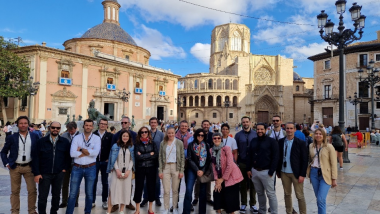EU-Projekt zur Verwertung ausgedienter Windturbinenflügel
Am 15. und 16. Mail fand das Kick-off-Meeting des REWIND-Projekts in Valencia, statt. REWIND befasst sich mit Verbundwerkstoffabfällen im Windenergiesektor. Es wird von Horizon Europe und CINEA (European Climate, Infrastructure and Environment Executive Agency) finanziert. Die Deutschen Institute für Textil- und Faserforschung (DITF) sind einer von 14 Partnern aus sieben Ländern.
REWIND steht für Efficient Decommissioning, Repurposing and Recycling to increase the Circularity of end-of-life Wind Energy Systems. Das Projekt befasst sich mit der Verwertung von Windturbinenflügeln, wenn sie das Ende ihrer Lebensdauer erreicht haben. Die Projektpartner entwickeln grundlegende Technologien für die Demontage des Verbundwerkstoffs und Methoden, mit denen das Material zerlegt und bewertet wird. Im nächsten Schritt werden Recyclingverfahren und Möglichkeiten für die Wiederverwendung der Verbundwerkstoffe erarbeitet. Ziel ist es, die Windturbinenflügel kreislauffähig zu machen statt sie zu deponieren oder zu verbrennen.
Bei diesem ersten Treffen besprach das Forschungskonsortium die Ziele des Forschungsvorhabens und die Vorgehensweise. Aufgabe der DITF ist es, aus den von den Projektpartnern rezyklierten Glas- und Carbonfasern ein Garn und ein Gewebe für neue Bauteile oder für Reparatur-Sets von Windkraftanlagen zu entwickeln.
Das Projekt wird durch das Horizon Europe Framework Programme (HORIZON) der Europäischen Union unter der Fördervereinbarung Nr. 101147226 finanziert.
Partner:
AIMPLAS
TECKNIKER
IPC – Centre Technique Industriel de la Plasturgie et des Composites
Miljøskærm
Hochschule Pforzheim – Gestaltung, Technik, Wirtschaft und Recht
Deutsche Institute für Textil – und Faserforschung Denkendorf (DITF)
Alke Electric Vehicles
Suez Group
Bcircular
Composite Patch
TPI Composites Inc.
R-Nanolab
CiaoTech-Gruppo PNO
AEMAC.
DITF







